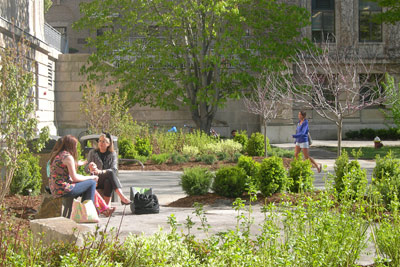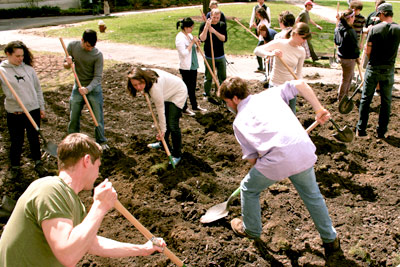Mann Library garden certified by 'green' landscape system
By Krishna Ramanujan


A garden space that flanks Cornell's Mann Library entrance is more than just a pretty place: It's one of only 11 landscapes in the country to be certified by the Sustainable Sites Initiative (SITES), a new "green" certification system for landscapes.
SITES is the nation's most comprehensive rating system for the sustainable design, construction and maintenance of built landscapes. Nearing the end of its pilot project phase to refine its guidelines and performance benchmarks, SITES complements -- and is affiliated with -- the U.S. Green Building Council's Leadership in Energy and Environmental Design (LEED) rating system for environmentally friendly buildings.
The Mann Library 5,000-square-foot entrance garden was site-assessed, designed and built by students in the 2009-10 in Creating the Urban Eden, a yearlong course co-taught by Nina Bassuk, professor of horticulture, and Peter Trowbridge, professor of landscape architecture. Each year, the class constructs a new landscape on campus. The students also documented the process and helped prepare the SITES certification application. The space had been a construction site with poor, heavily compacted soil prior to the garden's creation.
The garden's sustainable features include healthy soil remediated with Cornell-made compost for better percolation, nutrients and microorganisms; a design that will have a closed canopy in two to three years so plants mesh and block out weeds; removal of invasive species; site-appropriate, pest-resistant plants; the preservation of two trees; and benches.
"We used the same principles that we've been using before there was a SITES system, with soil remediation and percolation and plant selection, so there is little need for maintenance and watering after the plants are established," said Bassuk, who serves on the SITES vegetation and technical core committees.
The SITES 2009 rating system includes 15 prerequisites and 51 additional credits that total 250 points. Projects are awarded one through four stars for achieving 40, 50, 60 or 80 percent of the 250 points, respectively. Points are distributed through five areas: garden designs that promote water conservation, healthy soils, site-appropriate plantings, use of recycled and sustainable materials, and sites that encourage social interaction, healthy activity and environmental activity.
The Mann Library site was accredited with one star, an achievement for such a small site, said Bassuk. Larger sites have many more options for attaining points, she added.
The SITES pilot project was publicly introduced in 2009 as a partnership of the American Society of Landscape Architects, the Lady Bird Johnson Wildflower Center of the University of Texas at Austin and the United States Botanic Garden. The Mann Library Entrance project was one of 150 initial applications to the rating system. Forty more sites are under consideration. An updated system will be made public in early 2013 based on lessons learned during the pilot phase.
David Cutter, a senior landscape architect in the Campus Planning Office, played a major role in the project by working with Bassuk and Trowbridge to select appropriate project sites for their class, prepare base plans, and coordinate interactions with stakeholders and facilities colleagues. Cutter also worked on the Cornell team to ensure that the project met the standards and processes required by SITES. "It is my hope that once the SITES program is fully developed, Cornell will commit to meeting SITES standards for all major projects just as our major buildings must meet LEED Silver standards," Cutter said.
Media Contact
Get Cornell news delivered right to your inbox.
Subscribe